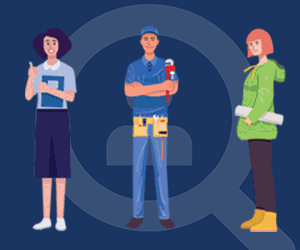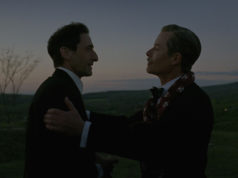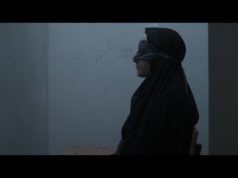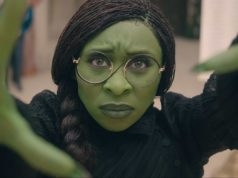Arguably my favorite annually recurring feature is this one in which I compile the best movie dialogue of 2019. If you’re new to this feature, it’s pretty simple. I reproduce the dialogue from a selection of films as it’s spoken on the screen, without access to the shooting scripts. The stage directions are mine. I don’t mention the directors or actors in these films unless they are also writers, and I don’t clutter up the feature with pictures, because it’s all about the words. Sit back and enjoy.
Greta Gerwig’s adaptation of Little Women takes large pieces of dialogue from the Louisa May Alcott novel that it’s based on, but there are also scenes like this one in the attic of the March house (after Beth has died) that sound contemporary without sounding out of place in the mouths of characters in the 1870s. That’s a big key to why the film doesn’t feel like a museum piece.
MARMEE (coming up the stairs): I didn’t want to disturb your writing.
JO: I don’t do that anymore. Didn’t save her.
MARMEE (sitting): You’re much too lonely here, Jo. Wouldn’t you like to go back to New York? What about your friend, Friedrich? Isn’t that his name?
JO: No, I ruined our friendship with my temper, just as I ruin everything. I’m sure I’ll never see him again.
MARMEE: I doubt that a sincere friend would be deterred.
JO: I wish that were true. If I was a girl in a book, this would all be so easy. Just give up the world happily.
(She sits.)
MARMEE: Laurie’s returned, you know.
JO: Oh, he is?
MARMEE: There was a letter from Amy. She’s coming home. She’s devastated about Beth. Aunt March is very ill, so Laurie will accompany them.
JO (getting up): That’s good of him.
(pause)
MARMEE: What is it?
JO: I don’t know. I’ve always been quite content with my family. Don’t understand it. Perhaps, um, perhaps I was too quick in turning him down, Laurie.
MARMEE: Do you love him?
JO: If he asked me again, I think I’d say yes. Do you think he’ll ask me again?
MARMEE: But do you love him?
JO: I care more to be loved. I want to be loved.
MARMEE: That’s not the same as loving.
JO: I know. (bursting out) You know, I just feel, I just feel like women, they have minds and they have souls as well as just hearts, and they’ve got ambition and they’ve got talent as well as just beauty, and I’m so sick of people saying that love is all a woman is fit for! I’m sick of it! But I’m so lonely!
I wanted a scene that features a group of people, and The Standoff at Sparrow Creek begins with seven members of a right-wing militia arriving one by one at a warehouse where they meet after hearing word that someone has shot up a police funeral in the area, resulting in a bloodbath. It’s a useful way of introducing us to the various members as well as the leader (Ford) and the ex-cop among them (Gannon). This bit of conversation starts when the members check the group’s supplies of weapons and ammunition, and make an unpleasant discovery.
GANNON (looking at the rack of AR-15s): One’s missing.
(Everyone stops what they’re doing to look. The slot labeled with the number 9 has no gun.)
FORD: Where’s 9?
(silence)
FORD: Who’s got it?
(no response)
FORD: They said he was wearing Kevlar. We’re supposed to have 25. How many?
BECKMANN (closing up the bag): Fewer than that.
FORD: Grenades? Last time I counted, we had two cases, 48. Safe to say we’re several short. The keypad on that door has a self-changing combination every 48 hours. The only people aware of that combination are in this room. One of you did it.
(more silence)
FORD (sighing): Please, just man up. Save us some pain and say you did it.
(again no response)
FORD: Do it, or I’ll radio the cops, give them our position.
MORRIS: Are you out of your mind?
FORD: If I don’t give up one of you and they find us, we all go down. Which one of you did it?
BECKMANN: Why would anyone do that? Why would he shoot up a bunch of cops and then come back here?
GANNON: Arsonists like to watch their work from a crowd. This isn’t much different.
FORD (to Beckmann): Where were you?
BECKMANN: Me? I was at work.
FORD (to Morris): Where were you?
MORRIS: McNeil’s Bar. What else?
FORD (to Hubbel): Where were you?
HUBBEL: On a hunt.
FORD: Prove it.
HUBBEL: There’s a still-warm eight-point buck in my truck bed.
FORD (to Keating): Where were you? (no response) Fucking sign or something. (to Noah) Huh?
NOAH: I was at the range. The guy working there sold me like 100 rounds probably 30 minutes ago.
MORRIS (to Gannon): And you? How do we know it’s not you? How are we sure this isn’t some “old cop attacks his own” shit?
GANNON: I was hunting. The truck’s outside.
MORRIS: So is mine. So what?
GANNON: I’m assuming you’ve hunted once in your life. You know the kill bleeds out in the back of your truck. Why don’t you go outside and take a look? I haven’t hosed it down.
MORRIS: Both you and Hubbel have dead game in your truck. A little convenient.
GANNON: Not really. It is deer season.
MORRIS: So you’re not a suspect because your car’s covered in blood?
GANNON (calmly): If I wanted to kill a bunch of cops and then come here and hide, it’s because I want to get away with it. If I want to get away with it, why would I leave blood in the back of my truck? And if I want to kill a bunch of cops and get away with it, I’m not puttin’ the dead ones in the back.
MORRIS: An old cop hermit living in the woods snaps. All of a sudden, there’s a shooting and his cover was hunting. And we’re the ones left to explain why we let him in in the first place.
FORD: Because four militias got taken down last year by infiltrating UC’s, and he keeps us clean. So unless you have something of use to say, no one leaves here until I find out who did it.
BECKMANN (laughing bitterly): How are you planning on doing that?
FORD (gesturing to Gannon): He’s gonna question you. Our only option is to prove our innocence, that it was a lone gunman. You say no, and we all go to war because one of us has lost his mind.
GANNON: I’m gonna need a baseline.
This early scene from Marriage Story shows you how to write a confession, as Nicole meets up with high-powered Hollywood divorce lawyer Nora. Noah Baumbach uses sentences that start with the word “and,” which is grammatically incorrect but mimics the way that people talk when they’re spilling long-bottled-up emotions. This is a marriage story in the most literal sense.
NORA: Honey, you take some breaths. And while you do, I’m gonna tell you about myself. If you should choose to hire me, I will work tirelessly for you, and I’m always available by phone or text, except when I’m with my kids. I insist on doing pickup and dropoff every day at school.
NICOLE: I understand.
NORA: I’ve been through this myself. (to administrative assistant, bringing in a tea tray) Thank you, Annie. (to Nicole) So, I know how it feels.
NICOLE: You do?
NORA: Yes. I had a kid from my ex, a narcissistic artist and verbally abusive. I’m now with a great boyfriend who lives in Malibu.
NICOLE: Good, but Charlie’s not terrible.
NORA: No, of course not. But they ravish you with attention in the beginning, and once we have babies, we become the mom, and they get sick of us. Where do you want to live now, doll?
NICOLE: Well, I’m here now, obviously. I don’t know if the show will get picked up, but it feels like home. It is home. It’s the only home I’ve ever known without Charlie.
NORA: You want to stay here.
NICOLE: Charlie’s not gonna want that. He, he hates L.A.
NORA: We’re interested in what you want to do. Sounds to me like you did your time in New York. He can do some time here now.
NICOLE: He always said we would, but we never did.
NORA: How old’s your son?
NICOLE: Henry’s 8.
NORA (adoring): Mmmm.
NICOLE: He likes L.A. I don’t know if it’s fair to him.
NORA: I want you to listen to me: What you’re doing is an act of hope. You understand that?
NICOLE: Yeah.
NORA: You’re saying, “I want something better for myself.”
NICOLE: I do.
NORA: And this right now is the worst time. It will only get better. Wasn’t it Tom Petty who said the waiting is the hardest part?
NICOLE: I don’t know.
NORA: I represented his wife in their divorce. I got her half of that settlement.
NICOLE: Oh, I don’t want money or anything. I just worry because we said we weren’t gonna use lawyers, so I don’t want to be too aggressive. I want to stay friends.
NORA (pouring tea): We’ll do it as gently as possible. Now, can you tell me a little more about what’s going on? Because part of what we’re gonna do together is tell your story.
NICOLE: It’s difficult to articulate. It’s not as simple as not being in love anymore.
NORA: I understand. Why don’t you start at the beginning, wherever that is for you?
NICOLE: Well, I was engaged to Ben and living in L.A., y’know? And it felt like, yes, I want to make movies and marry Ben. Jesus, I was only 19 or 20 at the time. I never felt older in my whole life. Anyway, if I was honest with myself, it was like a small part of me felt dead. Or deadish. Y’know, you tell yourself no one’s perfect, no relationship’s perfect. (taking a sip) Oh, this tea is delicious.
NORA: Isn’t it? It’s the Mānuka honey.
NICOLE: Mmm. Anyway, you were asking about Charlie. So, um, so yes. (putting down the tea and getting up) So I was, I was happy with Ben and aware of the deadness, and I went to New York to meet with this director for this space movie. But one where they take space seriously, like, sex trafficking in space. Y’know, it was political, or at least they wanted us to think it was. Anyway, it was really fulfilling the same need that certain fucked-up porn does. (going into the bathroom) Anyway, so, while I was there, the producer invited me to see a play. (blowing her nose) It took place in someone’s apartment with all the lights on. (coming back out) It was like nothing I’d ever seen before, this strange, surreal, dystopian story, and it was so well-acted. And one of the actors was this big shaggy bear who played all his lines looking directly at me, which I knew couldn’t be the case, but it felt like it. (sitting back down) And then later, of course, I learned that it was. (eating) These cookies are really great, too.
NORA: I’ll send you home with some.
NICOLE: Afterwards, I was introduced to the cast, and the bear turned out to also be the director. He talked to me, and (laughs) I talked back. The dead part wasn’t dead. It was just in a coma. And the talking was even better than the sex, although the sex was also like the talking. Y’know, everything is like everything in a relationship. Don’t you find that? So we spent the whole night and the next day together, and I just never left. Yes, to be honest, all the problems were there in the beginning, too, but I just went along with him and his life because it felt so damn good to feel myself alive. In the beginning, I was the actress, the star, and that felt like something, y’know? People came to see me at first, but the farther I got away from that and the more acclaim the theater company got, and I had less and less weight. I just became, “Who? Well, you know, the actress that was in that thing that time.” And he was the draw. And that would’ve been fine, but I got smaller. I realized that I didn’t ever really come alive for myself, I was just feeding his aliveness, and, y’know, he was so smart and creative, it was fine. You know, I would tell him things at home in private, and they would work their way into public conversation, into his work, and for a while that felt like enough. (getting up and moving to the sofa) I mean, I was just so, so, so flattered that someone like him would find an idea I had worth trying or a comment I made worth repeating, and, and then I got pregnant, and I thought that having a baby could be ours, could really be ours, but also really mine. And, y’know, he was so excited. So it was nice. For a while. I mean, kids, they belong to themselves. It’s like the instant they leave your body, it’s just the process of them going away. And I didn’t belong to myself. And it was small stuff, stupid stuff, and big stuff. All the furniture in our house, it was his taste. I didn’t even know what my taste was anymore, because I had never been asked to use it. I didn’t even pick our apartment, I just moved into his, and I made noises about moving back to L.A., but they came to nothing. And we’d come here on holidays because he liked my family, but if I suggested we do a year or something, he’d just put me off. It would be strange if he turned to me and said, “And what do you want to do today?” Y’know, I just watched that documentary on George Harrison, and I thought, “Own it. Just own it. Be like George Harrison’s wife. Being a wife and a mother, that’s enough.” Yeah, then I realized I couldn’t remember her name. So this pilot came along. It shot in L.A. and it paid so much and it was like there was this little lifeline thrown to me. Here’s this bit of earth that’s yours, and I was embarrassed about it in front of him, but it was also like, yeah, this is who I am and this is what I’m worth. And maybe it’s stupid, but at least it’s mine. And if he had just taken me into a big hug and said, “Baby, I’m so excited for your adventure. Of course I want you to have a piece of earth that’s yours,” well, then, we might not be getting divorced. But he made fun of it and was jealous like he is, and then he realized about the money, and he told me I could funnel it back into the theater company. And that’s when I realized he truly didn’t see me. He didn’t see me as something separate from himself, and I asked him to say my phone number. He didn’t know it. So I left.
NORA (giving her a hug): Oh.
NICOLE: Also, I think he slept with the stage manager, Mary Ann.
NORA: That fucking asshole.
I’ll admit I’m not familiar with J.C. Lee’s play Luce, but Julius Onah’s adaptation of it into a film just managed to avoid being stagey in telling the story of a white American couple named Peter and Amy who adopted an Eritrean child soldier named Luce who seems to be a model teenager. However, Luce’s teacher has just tipped them off to his authorship of an essay (for a class assignment) with some violent rhetoric and having discovered a large bag of fireworks in his school locker. In this early scene, Luce’s parents quiz him at the dinner table about the teacher without mentioning what the teacher has found.
LUCE: Okay, so who told you?
AMY: Told us what?
LUCE: You clearly know.
PETER: What do we know?
LUCE: You don’t know?
AMY: What is it you think we do or do not know, honey?
LUCE: Um, Coach Reeves offered me captain.
PETER AND AMY: Wow!
AMY: Oh my God, that’s amazing!
LUCE: Yeah, it’s dope. He thought I’d be a good example for certain teammates, but between track and debate prep plus all the extra shit Wilson has us doing…
AMY: How do you mean?
LUCE: Nothing, it’s just…
AMY: You really don’t like her, do you?
LUCE: It’s complicated.
AMY: Try me.
LUCE: Okay. You remember Stephanie Kim, right?
AMY (looking at Peter): Sort of.
PETER: No.
LUCE: She was in my homeroom a long time ago. Anyway, there were these rumors going around about her after a party a few weeks ago.
AMY: What kind of rumors?
LUCE: Oh, she was drinking. Nobody really knows what happened, but Stephanie got mixed up with these guys, and Wilson got involved. And no one can really prove anything, but Wilson started using Stephanie as an example. Turned her into a victim.
AMY: How?
LUCE: Well, we’d be talking about women in the Middle East or something, and she singles her out. Says some shit like, “We all know firsthand how important it is for women to have the courage to stand up, to fight.”
AMY: I don’t understand.
PETER: She’s not exactly singling her out.
LUCE: It’s how she says it. Like everyone’s a symbol to her. Stephanie, DeSean, it’s like we all exist to confirm the world is the way she sees it.
AMY: So, does she do that kind of thing with you?
LUCE: You kidding? I’m her fucking poster boy, black kid who overcame his tragic past. An example of why America works. It’s all bullshit.
AMY: So you don’t like her labeling you?
LUCE: I don’t like tokenism. What’s the difference between punishing someone for being a stereotype and rewarding them if they’re not?
AMY: Well, that comes with benefits.
LUCE: What you call a benefit, I call a responsibility that I didn’t ask for.
PETER: Okay, what about a responsibility to tell the truth?
LUCE: What?
AMY: Peter…
PETER: So one of the benefits you get is the benefit of the doubt, the chance to explain yourself.
LUCE: Explain myself?
AMY: Peter…
PETER: Where another student might not, so is there anything you want to tell us?
AMY: Peter, stop it.
LUCE: About what?
PETER (going back to his dinner): Ask your mom.
AMY (doing the same): Eat your food.
Writers-turned-directors turned pop up on this annual column pretty often, as you might imagine. Lorene Scafaria is one such, and she makes her first appearance here with this stretch from Hustlers, which she adapted from Jessica Pressler’s article. This begins with Ramona in her car, roping younger strippers Annabelle and Mercedes into her scheme to drug customers and defraud their credit cards. Then she does the same to Destiny in a restaurant, using the 2008 financial crisis as a justification for what they’re doing.
ANNABELLE: Are you serious?
RAMONA: It’s barely any different than what we’re doing now. It’s a shortcut, a sure thing.
ANNABELLE: What if somebody gets hurt?
RAMONA: Nobody’s gonna get hurt. The worst is they’ll have a bad hangover.
MERCEDES: What if somebody calls the cops?
RAMONA: And says what? “I spent $5,000 at a strip club. Send help!”? They won’t even know what happened until they check their bank accounts.
ANNABELLE: I think I’m gonna throw up.
RAMONA: We’re not the only ones doing this. How do you think the club stayed in business post-2008? It’s a side hustle. Everybody’s had to get creative, baby.
MERCEDES: I know a girl in Queens who did it.
ANNABELLE: Did she get caught?
MERCEDES: No. She sent her two kids to college, and now she lives in Miami. Opened up a nail salon.
RAMONA: Exactly. What do you think?
(The scene changes to a restaurant, where Ramona is talking alone with Destiny.)
DESTINY: What is it?
RAMONA: It’s ketamine and MDMA. The ketamine wipes their memory, the MDMA makes them happy.
DESTINY: How many times have you done it?
RAMONA: Three times, including tonight. Works every time. We make five grand tonight, split three ways. Could make it four. Be like old times. (pause) Baby, we gotta start thinking like these Wall Street guys. You see what they did to this country? They stole from everybody. Hard-working people lost everything, and not one of these douchebags went to jail. Not one! Is that fair? You ever think about when they come into the club? That’s stolen money. That’s what’s payin’ for their blowjobs. The fuckin’ firefighters’ retirement fund. Fuck these guys!
(pause while the waitress comes by to refill their coffees and leaves)
RAMONA: We can’t dance forever. What are you gonna do, go back to minimum wage? No, baby, this game is rigged, and it does not reward people who play by the rules. You either stand in the corner or get in the ring.
DESTINY: I don’t wanna hurt anybody.
RAMONA: Me either. Right? They would do this anyway. We’re just helpin’ ’em do it. Nobody gets hurt. Nobody gets hurt. So, are you in?
It was unusually difficult pulling an extract out of Knives Out for this feature, as Rian Johnson doesn’t have as many long stretches of dialogue as he does in his previous films. I couldn’t use Benoit Blanc’s instant-classic speech about donuts and donut holes either, because it’s the one in which he reveals the killer. However, I managed to extract this little bit when spoiled grandson Ransom arrives at the Thrombey family manse and stirs up confrontation among his parents Richard and Linda, his aunt Joni, his uncle Walt, and his younger cousins Meg and Jacob. What a pleasant group this family sounds like.
RANSOM: Hey Franny, how about a glass of cold milk?
MEG: Hey asshole, not her name, not her job.
RANSOM: Hey Meg, how’s the SJW degree coming?
MEG: Trust-fund prick.
JONI: All right, guys.
LAWYER (entering): Hey everyone, I’m just gonna be in the other room setting up. Be ready in 10 minutes.
(He leaves.)
WALT: Funny, Ransom, you skipped the funeral, but you’re early for the will reading.
JONI: Okay, people grieve in different ways. Let’s not…
WALT (cutting her off): You know, it’s funny you’re here at all. Why do you even bother? That’s what I’m asking myself.
RICHARD: What’s that supposed to mean?
WALT: He knows what it’s supposed to mean.
LINDA: Wait, Walt, what?
WALT: Jacob was in that bathroom the night of the party.
JONI (laughing): Oh, so that’s where you were all night.
RICHARD: What were you doing in a bathroom all night?
JACOB: Nothing.
MEG: Swatting Syrian refugees.
JACOB: No, I was not.
MEG: Alt-right troll.
JACOB: Liberal snowflake.
WALT: I don’t know what any of that means.
RICHARD: It means your son’s a little creep.
WALT: Oh, my son’s a creep?
JONI: Guys! Walt, he was in the bathroom.
RICHARD: That’s right, he was in the bathroom, joylessly masturbating to pictures of dead deer.
WALT (throwing down his cane): You know what, Richard, you wanna go?
RICHARD: You bet, Skippy. Let’s go.
(They fight ineffectually.)
JONI: Oh my God!
RANSOM (amused): We gotta do this more often.
Susanna Fogel, Emily Halpern, Sarah Haskins, and Katie Silberman are all credited with the script for Booksmart, but you know that the actors in the year’s funniest comedy did liberal amounts of ad-libbing. Kaitlyn Dever and Beanie Feldstein are the actors in this scene which takes place in Amy’s bedroom, as Molly speculates on how lesbian sex might bear some similarities to masturbation, only for the conversation to take a turn.
MOLLY: You do the same part she does. You just take what you do to yourself, flip it upside-down.
AMY: Well, I don’t always
MOLLY: Just a down flip.
AMY (hesitantly): What if I don’t use my hands?
MOLLY: You can make yourself come using only your mind?
AMY: No!
MOLLY: That’s, like, the one thing my mind can’t do!
AMY: I just use other stuff.
MOLLY (looking around the room): A book?
AMY: No.
MOLLY: Very Freudian, but I’d worry about paper cuts.
AMY (mortified): No. Can we just stop talking about this?
MOLLY: That little elephant?
AMY: No, stop!
MOLLY: That weird crochet pig?
AMY: My grandma gave me that right before she died!
MOLLY: If you don’t tell me what it is, you know I’m gonna guess.
AMY (cracks): The panda! It’s the panda! Okay? The panda. Whatever, just, can we stop talking about this please, for the love of all things?
MOLLY (standing up): Quick question. Just a quick Q. What happened to her eye?
AMY: That fell off way before anything happened between us.
MOLLY (tickled): Does she talk dirty to you?
AMY: Mmm-mmm.
MOLLY: Tell you about how she’s endangered?
AMY: No, stop!
MOLLY: Do pandas roar?
AMY: Stop!
MOLLY (laughing): You sneaky little bitch! I can’t believe that you didn’t tell me that you have been mounting that tragic panda every single night! Honesty, honestly, this is exhilarating. I thought I knew everything about you. I think it’s healthy for a relationship to have secrets, and now we have one. I have a secret for you. Okay, yes. Uh-huh. I once tried to masturbate with an electric toothbrush, but I got a horrible UTI. Horrible, like, horrible.
AMY: I wish that would’ve been a secret, but you’ve mentioned it many, many times.
We started this post with Greta Gerwig doing 19th-century dialogue, but here’s speech from The Lighthouse (written by Robert and Max Eggers) that feels like it truly comes out of another time. If anybody ever criticizes your cooking, here’s an amazing speech to use in response, calling down imprecations and the wrath of elemental forces. Winslow’s final line is great, but if he had said “What an eccentric performance” instead, that would’ve worked, too.
WINSLOW: What?
WAKE: What?
WINSLOW: What?
WAKE: What?
WINSLOW: What? What? What? What? What? What?
WAKE: What? What? What? What? What? What?
WINSLOW: You see, that’s what I mean! That’s the trouble with you.
WAKE: That’s the trouble with ye.
WINSLOW: With you!
WAKE: With ye!
WINSLOW (standing up): No! No! No! I want a steak! I want a goddamn steak! If I had a steak? Oh boy, a rare, a bloody steak, if I had a steak, I would fuck it.
(pause)
WAKE (offended): Ye don’t like me cooking?
WINSLOW (throwing a pillow at him): Oh, don’t be such an old bitch!
WAKE: Yer drunk! Ye don’t know what yer talkin’ about!
WINSLOW: How could I possibly like the horseshit you fix us for supper?
WAKE: Yer drunk, or ye wouldn’t be sayin’ that!
WINSLOW: Them tin-kitchen shanty cooks gave us fried doughnuts three times a day and country ham bigger than your fist.
WAKE: Yer drunk! Yer drunk!
WINSLOW: I’m drunk?
WAKE: Ye heard me! Damn ye!
WINSLOW: You’ve been drunk since I first laid eyes on this place.
WAKE: Yer fond of me lobster, ain’t ye?
WINSLOW (collapsing on the floor): You’re drunker than a Virginny fence.
WAKE: I’ve seen it, yer fond of me lobster. Say it! Say it! Say it!
WINSLOW (shaking his head): I don’t have to say nothin’.
WAKE (standing up): Damn ye! Let Neptune strike ye dead, Winslow! Hark! Hark, Triton, hark! Billow, bid our father The Sea King rise from the depths full foul in his fury, black waves teeming with salt foam to smother this young mouth with pungent slime, to choke ye, engorging yer organs till ye turn blue and bloated with bilge and brine and can scream no more! Only when ’e, crowned in cockle shells with slithering tentacled tail and steaming beard, take up his fell, befinnèd arm, his coral-tined trident screeches banshee-like in the tempest, and plunges right through yer gullet, bursting ye, a bulging blackguard no more but a blasted bloody film now nothing for the ’arpies and souls of dead sailors to pick and claw and feed upon only to be lapped up and swallowed by the infinite waters of the dread emperor himself! Forgotten to any man, to any time! Forgotten to any god or devil! Forgotten even to the sea! For any stuff or part of Winslow, even any scantling of yer soul, is Winslow no more, but is now itself the sea!
(pause)
WINSLOW: All right, have it your way. I like your cooking.













